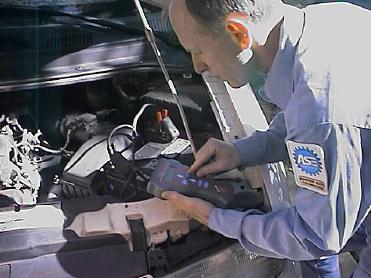STARTER MOTOR
The starter motor is a small high-output electrical motor powered by your car’s battery. Its job is to spin the engine and start it up. Starters usually give you notice when they are ready to give up the ghost. Indicators include grinding, groaning, clicking, and pure unadulterated silence when you turn the key to start the vehicle. What’s the noise all about?
Starter is grinding. Grinding could be due to a bad starter drive (the small gear that meshes with the flywheel on the back of the engine). Or it could be due to ground up teeth on the flywheel. The flywheel is a large ring gear. The starter meshes with this gear and spins the engine to start it. When the flywheel teeth get worn, broken, or chipped, you will hear grinding when you turn the key. Flywheel tooth damage usually occurs when a starter drive goes bad and is not replaced. The starter drive tries to mesh with the flywheel and grinds the flywheel teeth. Starting your vehicle with a bad starter drive results in irreversible flywheel damage, and that means more money out of your pocket.
Starter is groaning. If the starter groans or drags when you turn the key, it means that high resistance may have built up in the armature windings. Worn armature bushings will also cause this condition. A simple starter electrical draw test will confirm this; a high-amperage draw means that the starter needs to be replaced. So replace it or it could leave you stranded the next time you go to start the car after it sits for a while. Another clue that a starter has high resistance: When you start the car after it’s warmed up, the starter groans and drags. Replace it.
Starter is clicking. A clicking sound when you turn the key could indicate a faulty starter solenoid (the electromagnetic switch that actuates the starter). A few simple tests will confirm whether this is the case or not. Clicking can also be an indication of loose starter solenoid connections, because the solenoid is subject to engine vibration and often the nuts at the starter connections come loose and cause the clicking sound.
Starter is silent. Silence when you turn the key could mean a dead spot inside the starter. This happens when an area of the starter develops an open circuit. The starter motor spins when starting the engine; it then coasts to a stop. If the armature rests on a dead spot, the next time you try to start the vehicle you will get silence. Usually a tap on the side of the starter motor with a hammer will confirm this condition. What happens when you tap on the body of the starter? The armature inside is dislodged from the dead spot to a live portion of the armature and electrical power to the starter is restored. Replace the starter if this is the case.
